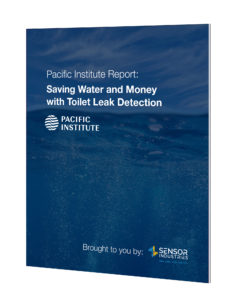The landscape of affordable housing can be challenging; property managers and owners are constantly seeking ways to improve Net Operating Income (NOI) while maintaining quality living conditions for residents. One often overlooked but highly effective strategy is the implementation of advanced water technology. By focusing on water management, affordable housing decision makers can significantly reduce operational expenses and boost NOI through three key levers.
1. Reducing Costly Waste from Toilet Leaks
Toilet leaks are a major source of water waste in multifamily properties. According to the Water Research Foundation, toilets account for nearly 30% of indoor water use in multifamily housing. Even small leaks can waste thousands of gallons of water annually, leading to inflated utility bills.
Advanced water sensing technology can detect these leaks early, often before they become visible. For example, Sensor Industries’ smart water management system identified that 40% of toilets in a 700-unit affordable housing property were leaking, wasting over 7 million gallons of water annually. By addressing these leaks promptly, property managers can significantly reduce water consumption and associated costs.
2. Minimizing Leak Remediation Costs
Water damage from undetected leaks can be extremely costly. The National Multifamily Housing Council (NMHC) reports that water damage claims are among the most expensive for multifamily properties, with an average cost of $20,000 per incident. Smart water technology can detect leaks in real-time, allowing for immediate intervention. This rapid response capability drastically reduces the extent of water damage and subsequent remediation costs. The U.S. Department of Energy’s Better Buildings program highlights that proactive leak detection can reduce water damage claims by up to 90%.
3. Reducing Insurance Premiums
Insurance companies are increasingly recognizing the value of water management technology in mitigating risk. Properties that implement these systems often qualify for reduced insurance premiums due to their lower risk profile.
The National Affordable Housing Management Association (NAHMA) notes that some insurance providers offer premium discounts of up to 15% for properties with advanced leak detection systems. This reduction in insurance costs directly contributes to improved NOI.
Real-World Impact: Standard Communities Case Study

A prime example of the effectiveness of water technology in affordable housing comes from Standard Communities, a leading affordable housing developer and operator.
After implementing Sensor Industries’ water management system across their portfolio, Standard Communities achieved remarkable results:
“The Sensor Industries water leak detection system has revolutionized our approach to water management, enabling us to increase NOI. With real-time monitoring and centralized reporting, we’ve not only reduced expenses and increased NOI but also demonstrated our commitment to sustainability. This partnership has enhanced our properties, and reinforced our mission to provide quality housing and foster strong communities.” said Michael Johnson, Senior Director, Sustainability of Standard Communities.
Get a free copy of the case study.
The impact of water technology on NOI is clear. The Pacific Institute estimates that water-efficient technologies can reduce a property’s water use by 15-50%, depending on the specific measures implemented. For affordable housing providers, this translates to significant cost savings and improved financial sustainability.
Moreover, the National Housing & Rehabilitation Association (NH&RA) reports that properties with advanced water management systems see an average increase in NOI of 3-5% annually. This boost in NOI not only improves the financial health of individual properties but also enhances the overall sustainability of affordable housing portfolios.
As water scarcity and costs continue to rise across the United States, leveraging water technology becomes increasingly crucial for affordable housing providers. By focusing on these three key levers – reducing waste from toilet leaks, minimizing leak remediation costs, and lowering insurance premiums – decision makers can significantly improve their NOI while contributing to water conservation efforts.
The Housing Authority of the City of Los Angeles (HACLA) serves as another success story, having implemented smart water management across its portfolio of over 9,000 units. HACLA reported a 20% reduction in water consumption and a 15% decrease in related maintenance costs within the first year of implementation.
In conclusion, water technology represents a powerful tool for affordable housing decision makers to enhance NOI, reduce operational expenses, and improve property sustainability. As the National Apartment Association (NAA) aptly puts it, “Water management is no longer a luxury – it’s a necessity for operational efficiency and financial sustainability in multifamily housing”. By embracing these technologies, affordable housing providers can ensure they remain financially viable while continuing to provide essential housing services to communities across the United States.
Don’t let water waste drain your profits. Get the case study today and discover how smart water management can transform your affordable housing operations.
Calculate Your Potential Savings
Your know your property, we know water. If you’re interested in how sensor technology can improve operational efficiency and deliver on sustainability targets, find out how much you can save with a complimentary assessment.

